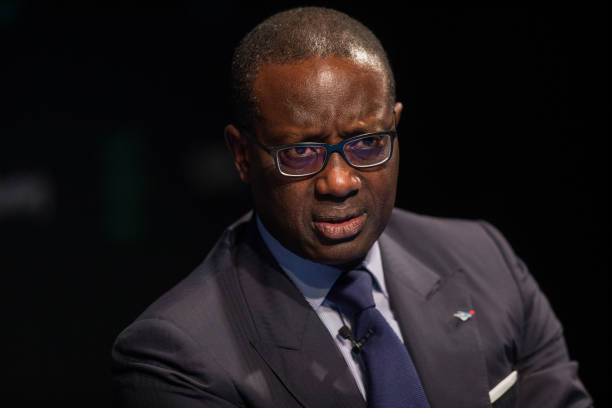Former Credit Suisse and Prudential CEO Tijan Thiam is thinking about running for president of the Ivory Coast, giving up his French citizenship in the process.
The French-Ivorian financier is thought to have sought counsel on his dual citizenship in front of a prospective 2025 run for the top position in the West African country.
If Mr. Thiam wishes to compete in the forthcoming presidential elections, he will probably need to make a decision regarding his citizenship within the next two and a half years. A foreign passport is not permitted for presidential candidates in Ivory Coast, who are required to be citizens by birth.
More than 20 years after leaving the Ivorian government following a coup to seek a career in banking, the decision will bring Mr. Thiam back into politics in the West African nation.
Before taking the helm of Prudential in 2009 and becoming the first black executive to be listed on the FTSE 100, he held positions at McKinsey and Aviva.
Six years later, Mr. Thiam departed to lead Credit Suisse. He was forced to leave in 2020 as a result of a corporate espionage controversy, even though he was cleared of any misconduct.
Since selling his Zurich property, Mr. Thiam is rumored to divide his time between London and Paris, the latter of which is his primary abode.
Beyond finance, he has also taken a keen interest in African politics, serving as a special envoy for the African Union where he helped the continent cope with the economic impact of the Covid pandemic.
Last month, Mr. Thiam traveled to the Ivory Coast – his first such visit in over 20 years – to meet and visit family.
Upon his arrival in Abidjan on 8 August, Mr. Thiam was received by the President of Côte d’Ivoire, Alassane Ouattara, at his home in the fashionable Cocody Riviera.
The meeting lasted an hour and was attended by Mr. Thiam’s older brothers, Governor of Yamoussoukro Augustin Thiam, and Transport Minister Aziz Thiam.
Mr. Thiam, great-nephew of the first President of Côte d’Ivoire, whose father was also an Ivorian politician, served under President Henri Conan Bedier from 1993 to 1999, before the government was overthrown in a military coup.
He was abroad at the time and returned to Côte d’Ivoire where he was placed under house arrest. The new military regime offered him the position of chief of staff, but Thiam refused and was exiled.
Mr. Thiam’s spokesman said he maintains “regular and cordial contacts” with former presidents Laurent Gbagbo and Mr. Bedier. He dated both men during his recent trip.
During their conversation, Mr. Thiam informed Mr. Bedier that he still backed his party.
He has, however, generally avoided getting involved in Ivorian politics since the coup and only returned to the battlefield in October 2020, during the most recent elections, when Mr. Ouattara’s chosen successor unexpectedly passed away.
Mr. Ouattara was ultimately elected for a third term in defiance of constitutional term restrictions, which sparked unrest and violence.
A few days before the election, Mr. Thiam declined to address the legitimacy of Mr. Ouattara’s conduct in an interview with TV5Monde, saying only that “we must maintain unity and avoid what separates.”
Mr Ouattara, who will be 83 at the time of the next election, met French President Emmanuel Macron in Paris at the time to discuss the crisis. Mr. Thiam’s name was mentioned as a possible addition to a future Ivorian government in the negotiations that followed.
Throughout his career, Mr. Thiam has often spoken of his guilt about living in a developed country, even though he feels he has a lot to do and contribute to the development of his native Ivory Coast.
Most recently, in December 2021, he fought off questions about his presidential ambitions in an interview with Jeune Afrique magazine.

